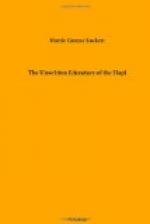“Then the Mud heads (masked Kachinas) furnish the music and young men dressed as leopards and mountain lion Kachinas climb into the tree tops and swing out over the canyon rim to time of the music. You can see the round holes in the rock there now.
“Well—it has always been this way among Hopi—when there is a dance, everybody goes to see.
“Now there was a dance at Mishongnovi and the boys from Huckovi went over to see it.
“Now the war chief at Huckovi was a great man that everybody looked up to, and he had only one son. This young man was so religious that he never went to this kind of just funny dances, but this time he went along with some friends. Long time ago the chief never goes to these dances, nor his son who will follow his steps.
“When they got to Mishongnovi the dance was going on and everybody laughing and having a good time, for the clown kachinas were going round pestering the dancing kachinas. These rough clown kachinas took turns appearing and disappearing, and some coming, others going away, then coming back.
“About the middle of the afternoon, came two Kachina racers to run with the clowns, and soon they began to call out some of the young men from the audience, known to be the best runners. After a while the son of Huckovi chief was chosen to run, but he was very bashful and refused to perform. But the Kachina who had chosen him as a competitor insisted and finally brought a gift of baked sweet corn and the young man was embarrassed and thought he had to run or be made fun of, so he came over and ran with this Kachina and beat him. They ran a long race, and the Kachina never could catch up with him, but when the boy stopped, the Kachina ran up and took hold of him and cut off his hair. The name of this Kachina was Hair Eater, and he was supposed to cut off the hair if he beat the boy, but he never did beat him.
“The Hopi, in those days, took great pride in their hair and would not cut it off for anything in the world.
“The people who saw what had happened were so sorry that the honorable son of the chief had been disgraced, that, to show their disapproval, they all left while the dance was still going on.
“When the boy got home his father was grieved to see his son coming home scalped, as he said. The father didn’t know what to do.
“Now the chief had a daughter twelve years old. He told her to practice running till she can beat her brother. Both the boy and the girl practiced a long time and at last the girl can run faster and farther than her brother.
“Then the father said, ‘I think it is good enough.’
“Soon the chief, he was the war chief, went to visit his friend, the war chief at Mishongnovi, and asked him to arrange a dance without letting the village chief know, because he said he wanted to give some kind of exhibition there.
“So his friend arranged the dance and four nights of practice followed. This dance was to be given by the Snow Kachinas. So that night the dance is going to be, the father and mother of the children baked up much sweet corn for them to take to this dance at Mishongnovi.




